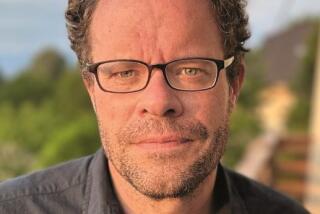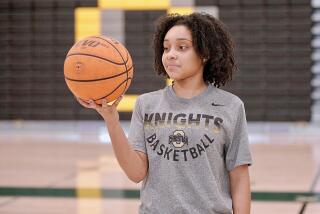Sound Player : Deafness No Hindrance to Kennedy High’s Fleischer in Basketball--or Anything Else
- Share via
Their uniforms neatly packed away until next season, most of the basketball players at Kennedy High have turned their attention to other sports and activities.
But the generally warm spring weather seems to have heated up interest in the game for Flavia Fleischer, perhaps Kennedy’s best known girls’ player. On most recent afternoons, Fleischer could be found shooting baskets alone on the school playground or taking part in pickup games in the gymnasium.
She was practicing for a tournament this week in Phoenix--a slightly different situation than she is accustomed to. The tournament is being sponsored by the American Athletic Assn. for the Deaf, with teams composed entirely of deaf players and coaches.
Fleischer, who has been completely deaf since birth, has spent most of her athletic career functioning capably in the hearing world both athletically and academically.
“This tournament is very important to me because it’s with my own people,” Fleischer said, with her longtime interpreter, Margie Smilanick, translating from sign language. “I don’t get to play with deaf people very often.
“It’s never been a problem playing with hearing people, but it will be nice to be involved in a different game for a change. It’s an important opportunity for me.”
To complicate matters Fleischer, a 5-foot-3 senior guard, is playing this week with teammates she has never met. She is suiting up for the Oakland East Bay team coached by her cousins, Rod and Charles Petersen. The tournament comprises high school boys’ and girls’ teams from throughout the nation.
Fleischer began playing organized basketball six years ago as a student at Portola magnet school in Tarzana. She fell in love with the game immediately and has been sharpening her skills since.
After playing for Kennedy’s junior varsity as a sophomore and a junior, Fleischer moved up to the varsity this past season. Coach Toya Holiday recognized Fleischer’s aggressive style of play and gave her part-time starting duties.
Kennedy has the winningest girls’ program in the Valley, having prevailed in all of its league games for the past 12 years.
“Flavia has such a great personality that she really fit well on the team,” Holiday said. “And her morale is always great. She gave it 110 percent every day. I can’t say that about all of my players.
“Her hard work propelled the other girls. If she ever screwed up, I just yelled at her like I would anybody else. I have never pampered her. I don’t really think she would want it that way.”
In a Northwest Valley Conference game against Chatsworth in February, the bigger and faster Golden Cougars held a commanding 35-point halftime lead. In the second half, there were plenty of smiles from Kennedy players on the court and laughter could be heard from the team’s bench.
The only player to ignore the early celebration was Fleischer, who remained unfazed by the lopsided score, wearing a determined look until the final buzzer. In the second half, she broke away for seven easy layups. The small group of Kennedy fans in attendance cheered loudly each time she scored.
Although Fleischer could not hear the applause, she was well aware that her 14-point effort that day was a season highlight. After the easy 93-26 victory, Fleischer changed her game face to smiles, patting teammates on the back as they boarded the bus for home.
It takes careful observation to realize Kennedy’s most competitive player is deaf. Fleischer knows her place on the court and is in rhythm with the game. She keeps her eye focused sharply on the ball to follow the action, and teammates set up plays with hand signals.
“It was never awkward with Flavia,” said Maria Fujarte, a teammate and Fleischer’s best friend. “If she ever got out of place, we just tapped her on the shoulder and pointed where she should be. But we do that for everybody.”
“When Flavia first came out for the team, some of the girls thought it might pose a problem. But it just never did. When she made the varsity, no one was surprised.”
The only time one might have picked up on Fleischer’s condition was during a timeout. As Holiday shouted instructions, Fleischer kept her eyes focused on her interpreter.
Smilanick, an L.A. Unified School District employee, has been Fleischer’s interpreter since Fleischer enrolled at Kennedy three years ago and goes to all of her classes, basketball practices and games.
On the rare occasions when Smilanick (nicknamed “Smiley”) is absent, Fleischer lip-reads.
“It’s just like Flavia hears,” Holiday said. “She always seemed to understand what I was saying. And if she didn’t, she sure faked it good. I sometimes forget she’s deaf.”
The only deaf student at Kennedy, Fleischer functions so capably in the hearing world, everyone seems to forget she is deaf.
“Most students at the school don’t know Flavia can’t hear,” said Smilanick, who learned sign language five years ago. “When I go into a class to sign for Flavia, the students that didn’t know about her can’t believe it. She doesn’t allow her deafness to be a handicap.”
Fleischer finished her high school career Feb. 16 on a disappointing note: Crenshaw defeated Kennedy, 68-57, in the first round of the City Section 4-A Division playoffs, and Fleischer was held scoreless.
But Kennedy’s misfortune didn’t represent the end of basketball for Fleischer. Aside from the AAAD tournament, she plans to play basketball at Gallaudet College (a school for the deaf in Washington, D.C.) in the fall. She also aspires to try out for the United States’ women’s team that will compete in the 1993 Deaf Olympic Games in Bulgaria.
“I have to continue playing basketball because I need the release athletics provide,” Fleischer said through the interpreter. “Sports help teach me how to deal with people. In rids me of stress and keeps me in shape. I want balance in my life.
“The fact that I can’t hear won’t stop me from playing sports. It’s not a handicap for me. If it bothers other people, that’s their problem.”
Aside from basketball, Fleischer played second base on the softball team as a sophomore and junior and is training with the track team this season but not competing.
Eventually, she would like to attend law school at UCLA or Cal.
Those who know her are confident she will attain her goals.
“I’ve spent the last four years with Flavia, and there hasn’t been one thing she wasn’t able to overcome,” Smilanick said. “She’s a serious student, active and enthusiastic. She’s also competitive. She doesn’t think there’s anything she can’t accomplish.”
Fleischer, 17, is an honors student and carries a 3.4 grade-point average. This semester she is studying sociology, trigonometry and economics and she writes for the school magazine. She has even studied French.
“That was tough, but I made it,” Fleischer said.
Her parents, Lawrence and Vera Fleischer, have been her role models. Both are deaf and are accomplished teachers. Fleischer’s father is the head of the deaf program at Cal State Northridge. Her mother teaches deaf students in the Pasadena School District.
Fleischer said the one advantage to being deaf on the basketball court is being able to tune out some unpleasant sounds.
“When my coach would yell, I couldn’t hear her,” Fleischer said with a wide smile. “It also helped me this past season in a game at Taft. I was at the free-throw line and everybody was screaming and waving their arms so I would mess up. But since I couldn’t hear them it didn’t bother me, and I could concentrate. I sank both free throws.”
More to Read
Get our high school sports newsletter
Prep Rally is devoted to the SoCal high school sports experience, bringing you scores, stories and a behind-the-scenes look at what makes prep sports so popular.
You may occasionally receive promotional content from the Los Angeles Times.






